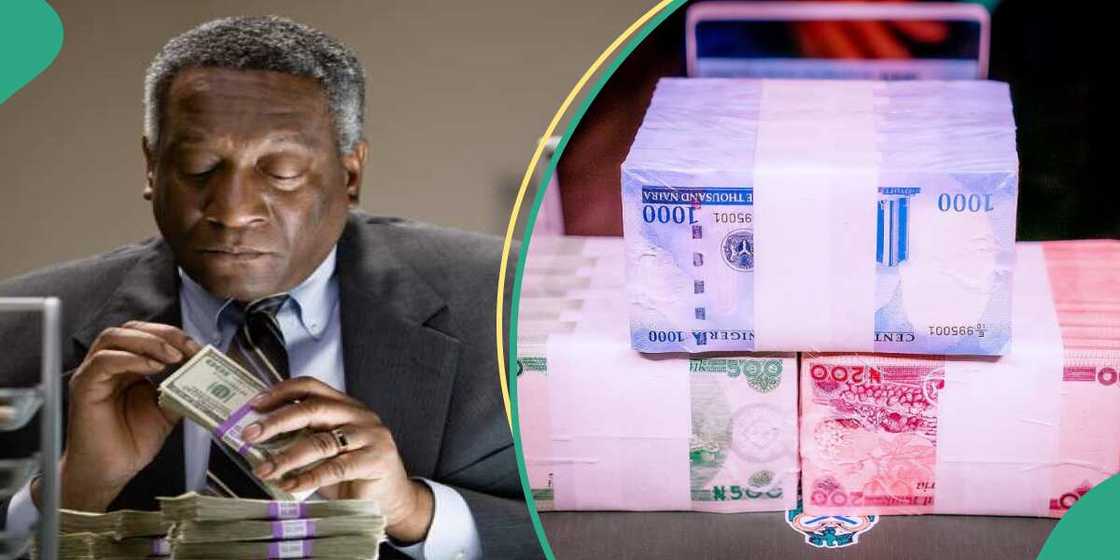No More N850/$: Naira Rebounds, Gains N31 to Dollar on New Inflation Rate
- The naira, which started the week with a dip, finally reversed direction on Wednesday, November 15
- In the unofficial market, however, the naira remained flat from the amount it closed the previous day
- This occurred as the inflation rate for the month of October 2023, according to NBS data, hits 27.33%
The naira reversed direction on Wednesday, November 15, 2023, to gain after two days of dip at the beginning of the week.
Official NAFEM data showed that the naira gained N31.23 or 3.81% to close at N818.99/$1 at the end of the day compared to the N850.22/$1 it closed on Tuesday.

Source: Getty Images
In the unofficial market, however, the naira remained unchanged from the previous day to close at N1140/$1.
This comes after a report that Nigeria's inflation rose to 27.33% in October 2023, according to the National Bureau of Statistics.

Read also
Forex speculators, hoarders hit with losses as naira maintains steady gains in black market
PAY ATTENTION: Сheck out news that is picked exactly for YOU ➡️ find the “Recommended for you” block on the home page and enjoy!
This represents a 0.61% point increase compared to the 26.72% in September 2023. The headline inflation rate was 6.24% points high on a year-on-year basis.
As contained in a BusinessDay report, the CBN claimed that its monetary policy reforms were already beginning to take shape.
The bank's Director of Corporate Communications Department, Isa AbdulMumin, said the recent inflation data indicated the CBN's monetary policy and money market reforms were yielding the desired effect.
Speaking on the inflation rate, Charles Abuede, a financial analyst, said the increase in Nigeria's annual inflation rate to 27.33% in October 2023, marks the tenth consecutive month of escalation.
According to him, the surge is attributed to a combination of factors, including heightened import costs, the depreciation of the Naira, and the government's removal of the fuel subsidy.
He stated:
The spike in food prices, a critical component of the Consumer Price Inflation (CPI) basket, is particularly concerning, reaching 31.52% in October and driven by various factors such as rising transportation costs, climate change impacts on food production, and increased insecurity in key agricultural regions.7
Abuede noted that analysis of the report highlights that the inflationary pressures are primarily concentrated in the food sector, with notable year-on-year increases in the prices of essential items like bread, cereals, oil, fat, vegetables, and more.
He added that the depreciating Naira has further amplified the cost of importing goods, while floods in key agricultural areas have damaged crops, contributing to the overall surge in food prices.
He added:
This complex interplay of economic and environmental factors underscores the significant challenges faced by Nigeria in managing its current inflationary trends.
"December deadline": Reactions trail CBN's fresh order on withdrawal of old Naira notes
The Central Bank of Nigeria (CBN) announced on Monday, November 13, 2023, that it had reversed the December deadline for withdrawing old naira notes from circulation, Legit.ng reported.
The declaration meant old N200, N500, and N1,000 notes would remain legal tender alongside the newly redesigned notes until they gradually faded from circulation.
However, some financial experts said that the CBN order contravened the Supreme Court directive that the old notes should be phased out by December 2023.
PAY ATTENTION: Donate to Legit Charity on Patreon. Your support matters!
Source: Legit.ng



